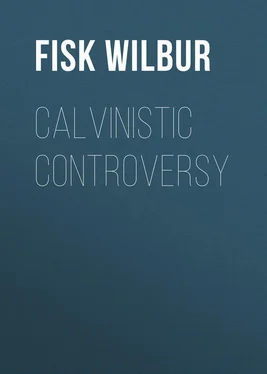Wilbur Fisk - Calvinistic Controversy
Здесь есть возможность читать онлайн «Wilbur Fisk - Calvinistic Controversy» — ознакомительный отрывок электронной книги совершенно бесплатно, а после прочтения отрывка купить полную версию. В некоторых случаях можно слушать аудио, скачать через торрент в формате fb2 и присутствует краткое содержание. Жанр: foreign_antique, foreign_prose, на английском языке. Описание произведения, (предисловие) а так же отзывы посетителей доступны на портале библиотеки ЛибКат.
- Название:Calvinistic Controversy
- Автор:
- Жанр:
- Год:неизвестен
- ISBN:нет данных
- Рейтинг книги:4 / 5. Голосов: 1
-
Избранное:Добавить в избранное
- Отзывы:
-
Ваша оценка:
- 80
- 1
- 2
- 3
- 4
- 5
Calvinistic Controversy: краткое содержание, описание и аннотация
Предлагаем к чтению аннотацию, описание, краткое содержание или предисловие (зависит от того, что написал сам автор книги «Calvinistic Controversy»). Если вы не нашли необходимую информацию о книге — напишите в комментариях, мы постараемся отыскать её.
Calvinistic Controversy — читать онлайн ознакомительный отрывок
Ниже представлен текст книги, разбитый по страницам. Система сохранения места последней прочитанной страницы, позволяет с удобством читать онлайн бесплатно книгу «Calvinistic Controversy», без необходимости каждый раз заново искать на чём Вы остановились. Поставьте закладку, и сможете в любой момент перейти на страницу, на которой закончили чтение.
Интервал:
Закладка:
2 2 It seems, to the author of the sermon, but little better than trifling, to object, as some have, to this argument on foreknowledge, that “God must predetermine his works before he could certainly know what would take place; and hence, in the order of cause and effect, he must decree in order to know.” It is readily conceded, that, in the order of nature, the Divine Being could not foreknow that a world would certainly exist, until he had determined to create it. But was there no prescience back of this? Did he determine to create a universe, independent of a view of all the bearings in the case? If so, he created at random and in ignorance. If not, then a view of all the results preceded his determination to create; and thus we are led irresistibly to the doctrine of the sermon, that “God foreknows in order to predestinate,”
But foreknowledge is pressed into this argument in another form. “The foreknowledge of God,” it is said, “is tantamount to a decree; because, inasmuch as God cannot be in a mistake, whatever he foreknows must take place – his knowledge makes it certain.” This is indeed shifting the argument; for if God’s knowledge makes an event certain, of course it is not his predetermination. But, according to this notion, every thing contained in the idea of predestination is implied in foreknowledge, which is only throwing the subject back on the ground first glanced at, that knowledge and decree are both one, which is obviously absurd. Beside, such an idea would make the scriptures that represent God’s foreknowledge as distinct from his decree and antecedent to it, worse than unmeaning: “Whom he did foreknow, them he did predestinate,” would mean, “whom he did predestinate, them he did predestinate” – and, “Elect according to the foreknowledge of God,” would only mean, “that the decree of election was according to the decree of election!” the absurdity of which is too apparent to need comment. And it may be urged, farther, in reply to this argument, that knowledge or foreknowledge cannot, in the nature of things, have the least possible influence in making an event certain. It is not at all difficult to conceive how the certainty of an event can beget knowledge; but if any one thinks that knowledge is the cause of certainty, let him show it – to me such a connection is inconceivable. Whatever God foreknows or foresees, will undoubtedly come to pass. But the simple question is, Does the event take place because it is foreknown, or is it foreknown because it will take place? Or, in other words, Does God know an event to be certain because it is certain, or does his knowing it to be certain make it certain? The question thus stated, at once suggests the true answer; for he would be considered a fool or a madman who should seriously assert that a knowledge of a certainty produced that certainty. According to that, a certainty must exist in order to be foreknown; and it must be foreknown in order to exist! From all which it appears that foreknowledge can have no influence in making a future event certain. Since, therefore, foreknowledge is not predestination; and does not, according to Scripture or reason, follow predestination as a consequence, and has no possible influence in making an event certain, no proof can be drawn from the Divine prescience in favour of the doctrine that God hath foreordained whatsoever comes to pass .
2. But predestination is argued from the necessity of a Divine plan. “It cannot be conceived,” it is said, “that God would leave things at random, and have no plan. But no alteration of his plan can take place upon condition that his creatures act in this or that way.” But this argument is easily answered, at least for the present. For it assumes what ought to be proved; and what has not, to my knowledge, ever been proved, viz. that to deny Calvinian predestination, is to deny that God has a perfect plan. We acknowledge and maintain that God has a plan, one part of which is, to govern his responsible subjects, without controlling their will, by a fixed decree – to punish the incorrigible, and save those who repent and believe. Does such a plan imply the necessity of a change, “on condition that his creatures act in this or that way?” If, indeed, it was necessary for God to decree an event, in order to foreknow it, this inference might be just. But as this is seen to be false, it follows that a perfect God, whose eye surveys immensity and eternity at a glance, and who necessarily knows all possibilities and contingencies; all that is, or will be, can perfectly arrange his plan, and preclude the possibility of a disappointment, although he does not, by a decree of predestination, fix all the volitions and acts of his subjects. Even in human governments, where the rulers can have no knowledge of the individuals who will transgress, or of the nature and extent of the transgressions, the principles and plan of government undergo no change to accommodate themselves to the contingent acts of the subjects. How absurd, then, to suppose that the all-wise Ruler of the universe will be subject to disappointment, unless he predestinate the transgressions of sinners, and the obedience of his saints! The truth is, in my view, this idea detracts from the wisdom of God; for the perfection of his plan, as they maintain it, is predicated on the imperfection of his attributes. But our view of the Divine plan accords well with our idea of his infinite nature. Over the universe, and through eternity, he throws his all-pervading knowledge – as he is in every point of wide immensity, so he is in every moment of long eternity – and can such a God be disappointed?
Читать дальшеИнтервал:
Закладка:
Похожие книги на «Calvinistic Controversy»
Представляем Вашему вниманию похожие книги на «Calvinistic Controversy» списком для выбора. Мы отобрали схожую по названию и смыслу литературу в надежде предоставить читателям больше вариантов отыскать новые, интересные, ещё непрочитанные произведения.
Обсуждение, отзывы о книге «Calvinistic Controversy» и просто собственные мнения читателей. Оставьте ваши комментарии, напишите, что Вы думаете о произведении, его смысле или главных героях. Укажите что конкретно понравилось, а что нет, и почему Вы так считаете.












